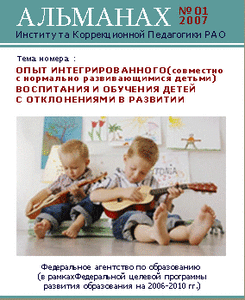Almanac #11 · · 2007

Why Integration in Education is Natural and Inevitable
Keywords
Why Integration in Education is Natural and Inevitable
civil societylegal consciousness
Europe
the West
values
integration
education
Special Education system of a New Type
Keywords
Special Education system of a New Type
combined educational institutionInstitute for Remedial Pedagogy
special education system
integrative education
mixed groups
Integrated Care and Education for Children with Developmental Disabilities
Keywords
Integrated Care and Education for Children with Developmental Disabilities
models of educational and social integrationspecial institutions
mainstream institutions
institutions of combined type
attitude towards integration
From the Experience of Educational Integration: Integrated Education of Preschool Children with Hearing Loss (from work experience), Moscow. SEI KINDERGARTEN No. 1365
Keywords
From the Experience of Educational Integration: Integrated Education of Preschool Children with Hearing Loss (from work experience), Moscow. SEI KINDERGARTEN No. 1365
mixed groupsmodels of joint care and education
special groups
mainstream groups
educator
deaf-and-dumb pedagogue
Integrated Education of Preschool Children with Hearing Loss in a Mixed Group (From Work Experience). SEI KINDERGARTEN No. 1365, Moscow
Keywords
Integrated Education of Preschool Children with Hearing Loss in a Mixed Group (From Work Experience). SEI KINDERGARTEN No. 1365, Moscow
joint care and educationmixed group
organization of children’s classes and activity
level of psychophysical and speech development
learning outcomes
From Work Experience in Integration of Children with Hearing Loss. SEI No. 1513, Moscow
Keywords
From Work Experience in Integration of Children with Hearing Loss. SEI No. 1513, Moscow
mixed groupsmodels of joint care and education
special groups
mainstream groups
educator
deaf-and-dumb pedagogue
level of psychophysical and speech development
learning outcomes
music director
Integrated Education of Children with Hearing Loss in a Special Correctional Orphanage. Kolomna
Keywords
Integrated Education of Children with Hearing Loss in a Special Correctional Orphanage. Kolomna
level of psychophysical and speech developmentspecial educational institution
mainstream educational institution
children with hearing loss
communication training
psychological readiness for integration
Teaching Children with Hearing Impairment at Mainstream School
Keywords
Teaching Children with Hearing Impairment at Mainstream School
inclusioninclusive education
tutoring
children with normal hearing and hearing loss
special needs assistance
specialists cooperation
Joint Learning Experience of Hearing and Hearing-impaired Pupils
Keywords
Joint Learning Experience of Hearing and Hearing-impaired Pupils
children with normal and impaired hearingspecial (correctional) school
secondary school
school of combined type
special classes
integrated classes
joint activities and lessons
Integrated education of pupils with disabilities in general education institution. Secondary school No. 73, Chelyabinsk
Keywords
Integrated education of pupils with disabilities in general education institution. Secondary school No. 73, Chelyabinsk
speech disordersmental retardation
integrated classes
mental deficiency
regular classes
flexible classes
psychologist’s and deaf-and-dumb pedagogue’s work